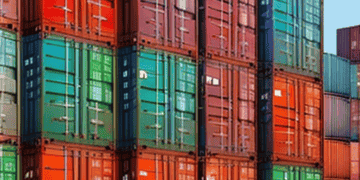The strategic positioning of Australia’s trade routes through Southeast Asia could face significant risks in the event of escalated tensions between China and the United States, potentially affecting the flow of international commerce. The Australian Defence Strategic Review has emphasized the importance of safeguarding these routes, which are vital for the nation’s exports and imports, with 90% of sea-borne exports and 83% of imports passing through the region.
A recent report by the Australian Strategic Policy Institute (ASPI), titled “The trade routes vital to Australia’s economic security,” highlights the critical shipping channels through Indonesia as particularly vulnerable. These channels are essential for transporting two-thirds of Australia’s exports, including all its iron ore and a majority of its liquefied natural gas from the west coast, and 40% of its imports.
The Malacca Strait, a narrow passage between Indonesia and Malaysia, is a key artery for global shipping, facilitating the movement of approximately 80,000 vessels annually. A blockage of this strait could necessitate rerouting around the south of Australia, significantly impacting shipping times and costs.
Moreover, the report notes the interdependence of trade flows, pointing out that a disruption in the Indonesian shipping channels would not only affect Australia but also China, which relies heavily on maritime imports for its iron ore, oil, and protein supplies.
The possibility of a distant blockade of China’s maritime trade, particularly through the Malacca Strait, has been explored by US strategic analysts as a means to interdict commercial shipping in potential conflict scenarios. However, the resilience of international trade, even in the face of military disruptions, has been demonstrated through various global challenges. The recent Houthi attacks on the Suez Canal and Russia’s aggression in the Black Sea have tested, but not fundamentally altered, global trade flows, thanks in part to alternative routing strategies and the provision of war-risk insurance.
The ASPI report underscores the competitive nature of the shipping industry, which often finds ways to adapt to geopolitical risks. This adaptability is seen in the rapid response of container ship operators to reroute following disruptions and the less significant impact on bulk and oil tanker shipping, reflecting the sector’s inherent resilience.
In light of these findings, the report calls on the Australian government to conduct a thorough review of the country’s container shipping supply chain security. It points out the need for updated contingency plans, including the provision of war-risk insurance and emergency chartering options, to ensure the continued flow of trade even in times of conflict. Additionally, it suggests revisiting legislation related to the requisitioning of shipping in wartime, to reflect contemporary trade dynamics and security concerns.
Stay current with supply chain report news at The Supply Chain Report. For international trade resources, visit ADAMftd.com.
#MaritimeTradeNews #AustraliaTrade #GlobalShippingNews #TradeRouteSecurityNews #EconomicSecurity















